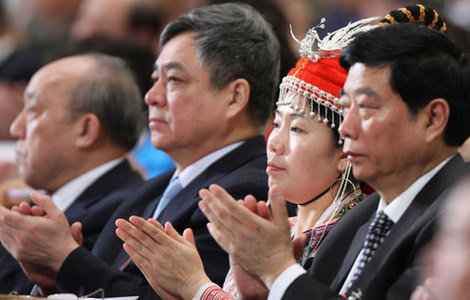 |
|
|
|
||||||||||||||
|
|||||||||||
China should help migrant workers' gain equal access to public services and welfare benefits in cities by establishing a mechanism to share the cost, said a senior official from the National Development and Reform Commission, the country's top economic planner, on Saturday.
Du Ying, deputy minister of the NDRC, said he agreed with the proposals from members of the Chinese People's Political Consultative Conference National Committee. He said speeding up China's reform of its hukou, or household registration system, is the key to integrate migrant workers into cities.
The hukou system, as a legacy of China's planned economy, regulates population mobility and imposes limits for migrant workers on subsidized medical care, public educational resources and affordable housing schemes in cities.
Huang Ming, deputy minister of public security, said the proposed reform should not be understood as the abolishment of household registration. But the proposal would prevent hukou from being used as a precondition for access to social welfare and services.
Du cited a study conducted by the Development Research Center of the State Council, which said it costs about 80,000 yuan ($12,640) to resettle a migrant worker, therefore, it requires an investment of 20 trillion yuan to grant full urban status for the country's 250 million population flowing from rural to urban areas.
"Migrant workers should not undertake this reform cost alone. Our government, employers, migrant workers and urban residents should share this expense," said Du.
Wang Shuping, a member of the CPPCC National Committee and an artist, said he believed that government should play a dominant role in increasing investment and modifying policies to ensure migrant workers can enjoy the same treatment as urban residents.
A proposal released by the CPPCC National Committee on Saturday revealed that the coverage of migrant workers in the basic social security system is still very low.
It said the insurance coverage rate for migrant workers is about 18 percent for retirement, 30 percent for medical, 38 percent for work injury and 11 percent for unemployment.
Chi Baorong, a member of the CPPCC National Committee and a doctor from Northeast China's Jilin province, said that a large part of migrant workers work in construction sites and chemical factories or other workplaces with harsh environment.
Many employees refuse to buy insurance for migrant workers, who are usually hired as temporary staff, which puts the workers at a high risk of work injury and lack of financial support in their old age with worsened health conditions, she said.
Chi urged the legislature to protect migrant workers' rights and better regulate employers' acts.
Wu Ying, iPad, Jeremy Lin, Valentine's Day, Real Name, Whitney Houston, Syria,Iranian issue, Sanyan tourism, Giving birth in Hong Kong, Cadmium spill, housing policy

|

|

|

|

|

|